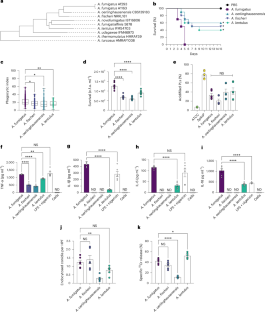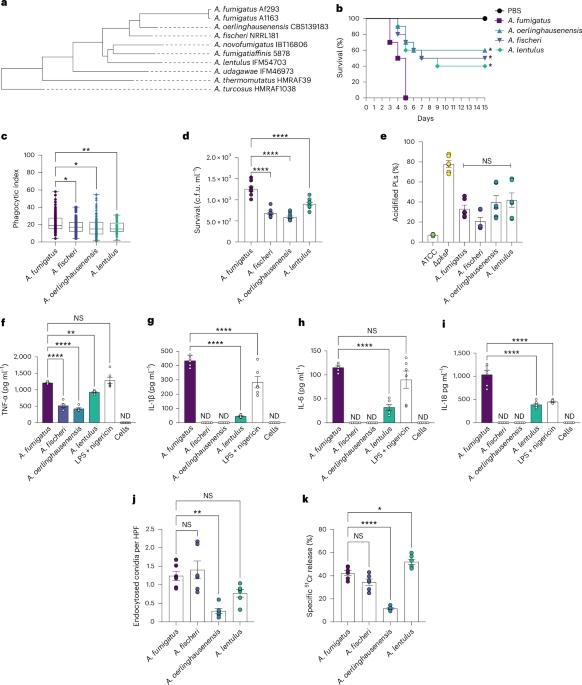Aspergillus fumigatus conidial surface-associated proteome reveals factors for fungal evasion and host immunity modulation
IF 20.5
1区 生物学
Q1 MICROBIOLOGY
引用次数: 0
Abstract
Aspergillus fumigatus causes aspergillosis and relies on asexual spores (conidia) for initiating host infection. There is scarce information about A. fumigatus proteins involved in fungal evasion and host immunity modulation. Here we analysed the conidial surface proteome of A. fumigatus, two closely related non-pathogenic species, Aspergillus fischeri and Aspergillus oerlinghausenensis, as well as pathogenic Aspergillus lentulus, to identify such proteins. After identifying 62 proteins exclusively detected on the A. fumigatus conidial surface, we assessed null mutants for 42 genes encoding these proteins. Deletion of 33 of these genes altered susceptibility to macrophage, epithelial cells and cytokine production. Notably, a gene that encodes a putative glycosylasparaginase, modulating levels of the host proinflammatory cytokine IL-1β, is important for infection in an immunocompetent murine model of fungal disease. These results suggest that A. fumigatus conidial surface proteins are important for evasion and modulation of the immune response at the onset of fungal infection. Analysis of the conidial surface proteome of the fungal pathogen Aspergillus fumigatus and three closely related species reveals factors important for evasion and modulation of host immunity


曲霉分生孢子表面相关蛋白质组揭示了真菌逃避和宿主免疫调节的因素。
烟曲霉会引起曲霉菌病,并依靠无性孢子(分生孢子)启动宿主感染。有关烟曲霉菌蛋白质参与真菌逃避和宿主免疫调节的信息很少。在此,我们分析了烟曲霉、两种密切相关的非致病性曲霉--费舍里曲霉和奥林豪森曲霉以及致病性的扁平曲霉的分生孢子表面蛋白质组,以确定此类蛋白质。在确定了专门在烟曲霉分生孢子表面检测到的 62 种蛋白质后,我们评估了编码这些蛋白质的 42 个基因的无效突变体。其中 33 个基因的缺失改变了对巨噬细胞、上皮细胞和细胞因子产生的易感性。值得注意的是,一个编码假定糖基天冬酰胺酶的基因能调节宿主促炎细胞因子IL-1β的水平,对免疫功能正常的真菌病小鼠模型中的感染非常重要。这些结果表明,烟曲霉分生孢子表面蛋白对真菌感染初期免疫反应的规避和调节非常重要。
本文章由计算机程序翻译,如有差异,请以英文原文为准。
求助全文
约1分钟内获得全文
求助全文
来源期刊

Nature Microbiology
Immunology and Microbiology-Microbiology
CiteScore
44.40
自引率
1.10%
发文量
226
期刊介绍:
Nature Microbiology aims to cover a comprehensive range of topics related to microorganisms. This includes:
Evolution: The journal is interested in exploring the evolutionary aspects of microorganisms. This may include research on their genetic diversity, adaptation, and speciation over time.
Physiology and cell biology: Nature Microbiology seeks to understand the functions and characteristics of microorganisms at the cellular and physiological levels. This may involve studying their metabolism, growth patterns, and cellular processes.
Interactions: The journal focuses on the interactions microorganisms have with each other, as well as their interactions with hosts or the environment. This encompasses investigations into microbial communities, symbiotic relationships, and microbial responses to different environments.
Societal significance: Nature Microbiology recognizes the societal impact of microorganisms and welcomes studies that explore their practical applications. This may include research on microbial diseases, biotechnology, or environmental remediation.
In summary, Nature Microbiology is interested in research related to the evolution, physiology and cell biology of microorganisms, their interactions, and their societal relevance.
 求助内容:
求助内容: 应助结果提醒方式:
应助结果提醒方式:


